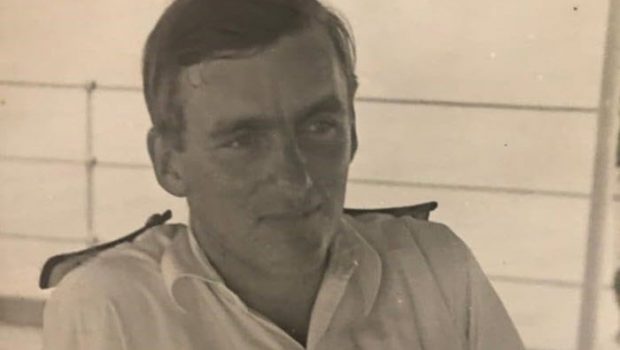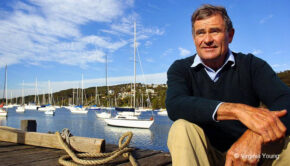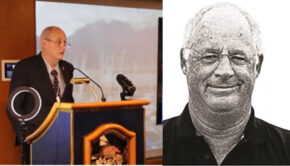Eight Bells: Peter Poland
Published on October 1st, 2021
Lieutenant-Commander T.P.G. (Trevor Peter Gordon) Poland, who hunted battleships, as well as being an insurance broker and an international yachtsman, died at home in Cape Town on August 30, 2021. He was 98.
Often called Peter, the 17-year-old Midshipman in May 1941 was navigator’s tanky (assistant) to Commander Frank Lloyd, Master of the Fleet, in the Home Fleet flagship, the battleship King George V. Intelligence was received from the naval attaché in Stockholm that the German battleship Bismarck had been sighted off the coast of Sweden.
Lloyd instructed Poland: “Well, Mid, it looks as if we’ve got the bastard. Don’t forget to get everything down in my notebook. I would rather have too much than too little. Write down your own observations as well. Make sure that you’ve got a good supply of pencils.”
Gifted with extraordinary powers of observation and memory – aided by his letters home to his mother, his midshipman’s journal, and the navigational notebook which he kept during the action – Poland left a unique memoir of the hunt for and sinking of Bismarck.
He was on the bridge at dawn on May 24 and saw the Yeoman of Signals hand a signal to the captain. He observed the look on his captain’s face as he told his admiral that the battlecruiser Hood had blown up and sunk, and recalled that “it seemed impossible – how could Hood, pride of the Royal Navy, possibly have gone so quickly?”
He recorded, too, the anxiety when Bismarck vanished into the mists of the Atlantic; there was relief when she began to send a long radio signal, which gave away her position, turning to surprise when Lloyd’s plotting her showing her to be to the north-east, and the fleet turned north to intercept.
By 16.00 that evening, however, it was clear that something was wrong. The enemy should have been sighted. Two hours later, Poland was in the charthouse preparing for evening star sights when Lloyd strode in and ordered: “Get out the Admiralty list of radio signals and the signal giving the direction-bearings, Mid.”
After a few minutes’ work, Lloyd suddenly shot bolt upright. “Christ, no!” he exclaimed. “They’ve forgotten half convergency.” Poland knew that there were two forms of chart in use, gnomonic, which takes account of the Earth’s curvature, and Mercator’s projection, which assumes the earth to be flat. The line between two points on the latter chart is known as a rhumb line, and the arithmetical correction known as half convergence, which when applied by Lloyd showed Bismarck to be south-east, as the uncorrected bearings had shown.
Poland was present when this was explained to the commander-in-chief, who immediately ordered King George V to turn southwards.
All night, Poland stayed with Lloyd, listening when the C-in-C discussed tactics for the battle which was now inevitable. He was on the bridge at dawn on May 27, when “we all sighted Bismarck at the same time. The long, low silhouette of an enormous battleship emerged through the haze about 10 miles distant. Even at that distance her beauty was evident … It seemed a great pity that we were destined to destroy a ship of such beauty, but from then on the battle became a blur of noise and explosions.
“The sound of battle was now a continuous cacophony, the sea around the enemy almost a continual curtain of spray. We closed until the range was down to about two thousand yards and guns were firing over open sights, at fixed range; the shells traveling into the enemy, and I could see the damage we were inflicting.
“Her enormous guns were bent double as if they were paper-clips. Her upperworks were a jumble of torn steel. I could see jagged holes in her side through which the orange glow of fires was evident. In her wake trailed a heavy haze of smoke.”
Running low on fuel, the C-in-C ordered his battleships to break off the engagement, and left his cruisers to finish off Bismarck with torpedoes.
Trevor Peter Gordon Poland was born on July 24, 1923 at Grayswood, Surrey, the scion of a family of insurance brokers; his mother’s father was Sir Trevor Chichele-Plowden, one-time Resident of Hyderabad.
Young Peter spent his childhood at Downlands, the family’s country estate in east Hampshire, where he was inspired by reading Arthur Ransome and Percy F Westerman to go to sea. He learnt to sail at Itchenor, was educated at Avisford prep school in Sussex and entered Dartmouth in January 1937; his first ship in September 1940 was the battleship Nelson.
In early 1941, Poland took part in the pursuit of the German battlecruisers Scharnhorst and Gneisenau in the Atlantic, finally driving them into Brest, and when Russia was invaded Nelson covered Arctic convoys and took part in the pursuit of the newest German battleship, Tirpitz.
In 1942 he took command of a flotilla of landing craft for the Allied landings in North Africa, including the assault on Bougie, heavily opposed by the Luftwaffe; an anti-aircraft cruiser and four out of six landing ships were sunk.
He returned to the Arctic in the destroyer Matchless, on convoy escort duties as well as taking part in the pursuit and sinking of Scharnhorst on Boxing Day 1943, before becoming first lieutenant of, first, the destroyer Scimitar, and then Haydon, fighting in both the Channel and the North Sea.
Postwar, Poland remained at sea, with occasional breaks for leave and courses, until 1956, but he was bitterly disappointed when failing eyesight ended his career. His brief entry into the family insurance business was not a success, though he claimed to have made a profit out of motor insurance, and after a family disagreement he was made redundant in 1968.
His life now revolved around sailing – in the Mediterranean, the South Atlantic, and the Caribbean, including three races from Cape Town to Rio. He had been a member of RORC, the Royal Ocean Racing Club, since his first Fastnet race in 1939, and although he was highly competitive, it was important for him to sail with those whose company he enjoyed ashore as well as afloat.
While living in Cheyne Row, Chelsea, London he made the Princess of Wales pub in Dovehouse Street a venue and ‘gathering place’ for international yachtsman, but heaven for him was aboard his beloved yacht Matchless with a beer and a cheese sarnie, and he always slept on board.
Some of Poland’s sailing experiences were incorporated into three novels, and in 2013 he published an autobiography, Hands to Action Stations – Memoirs of a Very Young Naval Officer.
He remained his own man, unconstrained by social convention, and loved the simple life – so long as it revolved around sailing. Although seemingly vague, he was a keen observer of character, with a big heart and a generous and loyal nature.
He married, in 1944, June Bowlby, and after her death in 1969 he married a South African, Lorette Durr, who predeceased him in 2014. He is survived by a son (Peter ‘PK’ Poland) and a daughter from his first marriage, and a daughter of the second marriage.
Source: https://www.telegraph.co.uk/








 We’ll keep your information safe.
We’ll keep your information safe.